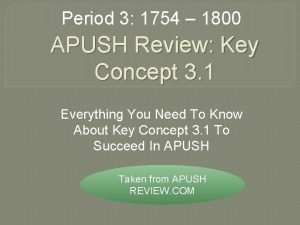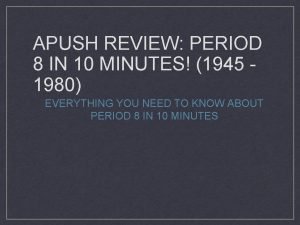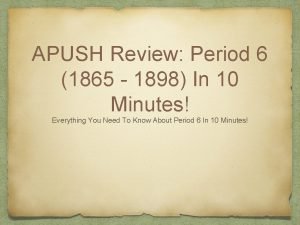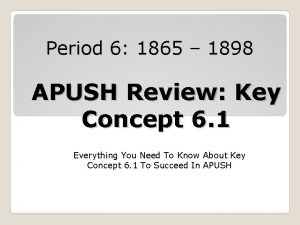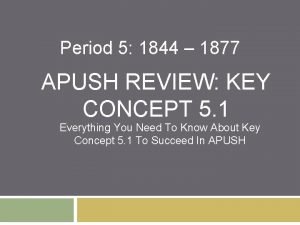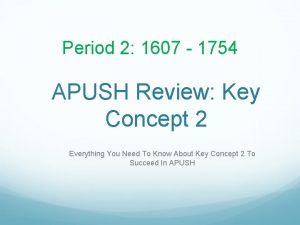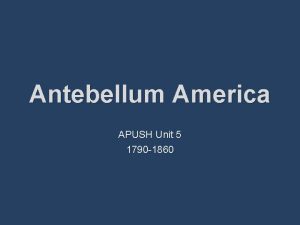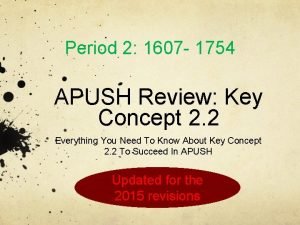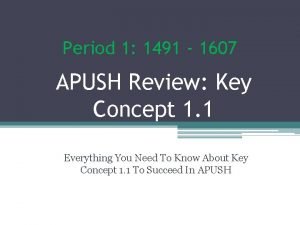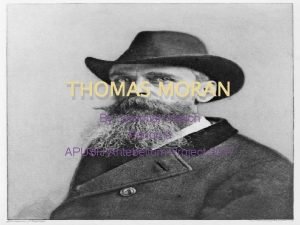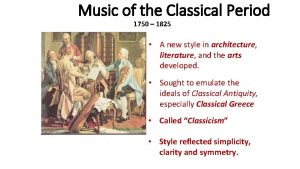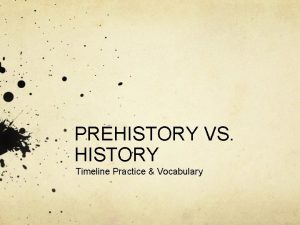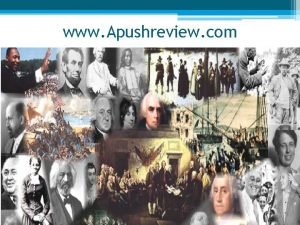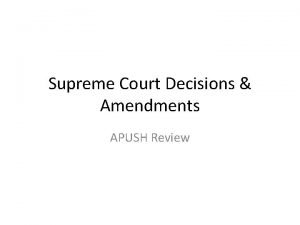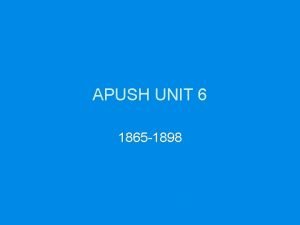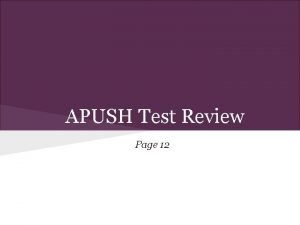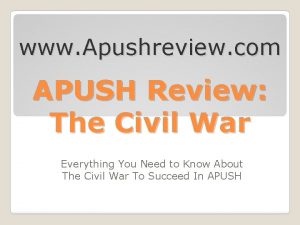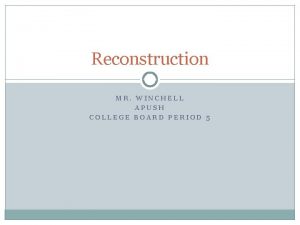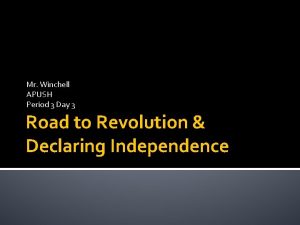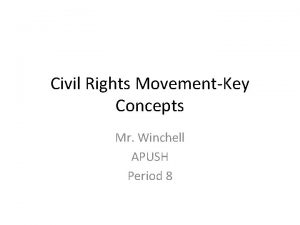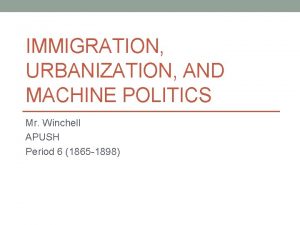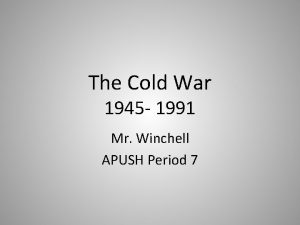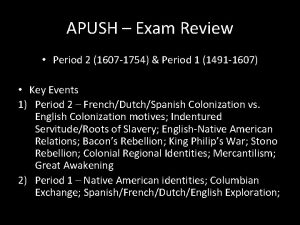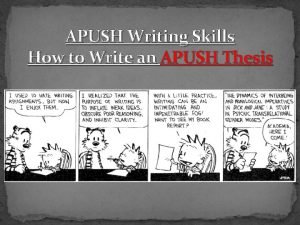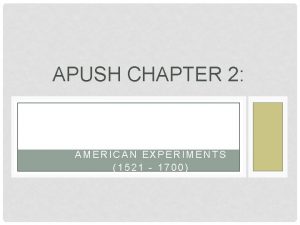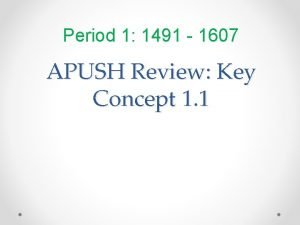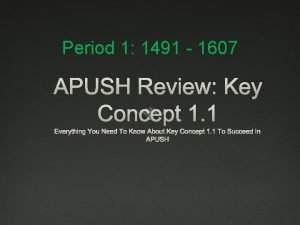APUSH REVIEW FOR YOU Period 5 Mr Winchell





































- Slides: 37

APUSH REVIEW FOR YOU Period 5 Mr. Winchell Review 2017 -2018

Big Ideas • • New Land, New Problems The Turbulent 1850 s Lincoln’s Election and Secession The Civil War: Militarily, Economically, Politically • Reconstruction: Successes, Shortcomings, and Legacies

New Land • Texas via Annexation-1845 • Mexican Cession via Treaty of Guadalupe Hidalgo -1848 • Gadsden Purchase-1853 • Ostend Manifesto (FAILED) • Expansion fueled by: – – Manifest Destiny Economic Benefit National Security Interest US racial superiority


Sectionalism • North doesn’t want expansion of slavery – Free Soil Party – Abolition – Wilmot Proviso • South does want expansion of slavery – ‘Positive Good’ – Support for MA War – Popular Sovereignty

Solution • Compromise of 1850 – CA enters Union as a free state – Slave trade OUTLAWED in DC – New Fugitive Slave Law in effect in North – Popular Sovereignty in rest of territory gained from Mexico – Texas border dispute settled



Expansion of Slavery in the 1850 s • Kansas-Nebraska Act (1854) – Stephen Douglas’ brilliant idea to gain Southern support for a transcontinental railroad through HIS state of Illinois – Repeals Missouri Compromise and OPENS Kansas and Nebraska territories to slavery via popular sovereignty – HUGE opposition in the North-Republican party forms in opposition • Dred Scott v. Sanford (1857) – Slaves are property-can’t be taken away w/out due process – Congress can’t ban slavery from territories – African Americans aren’t citizens and therefore have no right to sue for freedom in the Supreme Court • John Brown’s raid at Harper’s Ferry (1859) – Another spark

THIRD PARTY SYSTEM 1860 - 1896 Major Party Comparison Republicans (GOP) Democrats • • • National policies – – – • • Hard money policies/gold standard Northeast Pietistic denominations and sects (Methodists, Congregationalists) Split over civil service reform – – – • Homestead Act Land grants and infrastructure (railroads) Protective tariffs Stalwarts – supported patronage Half-breeds – civil service reform Mugwumps – frustrated with GOP corruption Appealed to businessmen, industrialists, professionals, scalawags, carpetbaggers, blacks/freedmen • • • Laissez-faire policies Low tariffs Solid South Liturgical denominations and sects (Catholics) Bourbon Democrats – pro-business Democrats Redeemer Democrats – Southern Democrats return to power in Solid South Appealed to traditional laissez-faire Democrats, small farmers, unskilled labor, urban immigrants

Societal Differences by 1860 North • Economic: – Manufacturing, free labor, industry • Demographic: – MORE people, immigration influx • Cultural: – Education, community, abolitionism • Garrison, Uncle Tom’s Cabin, Douglass, David Walker South • Economic: – Agricultural, plantation, slave labor • Demographic: – LESS people, less diversity, less immigration • Cultural: – Defense of slavery, isolated culturally, more homebased • Positive Good-Fitzugh and Calhoun • Nullification Theory

Election of 1860

The constitution of the Confederacy was similar to the U. S. Constitution except that it: Protected slavery and states’ rights Outlawed tariffs Created a weak national government Elected Jefferson Davis as Confederate president


Lincoln and civil liberties • Habeas Corpus – Lincoln Suspended the right, Taney ruled he couldn’t do that, he did it anyway… • Vallandigham Case – Congressman, spoke against the war, elected out of office, wouldn’t shut up. • Freedom of the Press – Closed down 2 newspapers in NY that were publishing fake stories about war and Lincoln. (Journal of Commerce and The World)

Lincoln and the draft • Ongoing problem recruiting Union soldiers • “Cause” of the war was vague – “Preserving the Union? ” • Both sides resorted to conscription (draft) by 1863 • Union law allowed purchase of a substitute recruit for $300 fee • “Rich man’s war, poor man’s fight”

NYC Draft Riots

The Union and Blacks/Slaves • • The idea of ending slavery was difficult for Lincoln – Border states were slave states, ex. Kentucky – Slavery is constitutional – Racism in the North and among Democrats – Re-election in 1864? Emancipation Proclamation (January 1, 1863) – “freed” slaves in Confederate states – Slavery became an “official” cause of war • Gettysburg Address • • Army of Freedom – 54 th Massachusetts (Glory) - unequal pay – 200, 000 participants; 37, 000 casualties Thirteenth Amendment (December 1865) “If slaves will make good soldiers, our whole theory of slavery is wrong. ” Georgia general


“Peace” Democrats • Opposed emancipation • Wanted immediate end to war • Wanted to restore Confederacy to the Union through negotiation • Nicknamed “Copperheads”

Mc. Clellan the Peacemaker?

Sherman Scorches Georgia – Georgia’s conquest: • It was entrusted to General William Tecumseh Sherman • He captured Atlanta in September 1864, burned the city in November 1864 • Sherman with 6000 troops cut a sixty-mile swath of destruction through Georgia • Major purposes of Sherman’s march: – destroy supplies destined for the Confederate army – weaken the morale of the men at the front by waging war on their homes – Rebuilt public support for the war with election pending

Presidential Election of 1864

Peace • Appomattox - April 9, 1865 – Lee surrenders to Grant • Confederates until the very end… – Guerilla tactics and “The South will rise again!”

From 1863 -1865, the lack of Southern resources & unity as well as the Northern advances into the South led to the end of the Civil War

Northern celebration was short lived; On April 14, 1865, Lincoln was shot by John Wilkes Booth ….

Effects of the War • Political – Northern Republican Control, Southern Power Decimated • Economic – War is Expensive…rebuilding is also expensive • Social – Women and African Americans

The Aftermath of the Nightmare • The extreme states’ righters were crushed • The national government, tested in the fiery furnace of war, emerged unbroken • Nullification and secessions were laid to rest • The Civil War was the supreme test of American democracy • The preservation of democratic ideals was subconsciously one of the major objectives of the North


Political Spectrum of Reconstruction Radicals Moderates Federal Supremacy Black Civil Rights Military Occupation Unionists Redeemers States’ Rights Blacks as Second-Class Citizens Home Rule KKK

3 Phases of Reconstruction • Presidential Reconstruction (1863 -1866) • Congressional (or Radical) Reconstruction (1867 -1877) • Redemption (1877 -1900)

Freedmen’s Bureau • Bureau of Refugees, Freedmen, and Abandoned Lands in March 1865 • Food, shelter, medicine for freed blacks and displaced whites • Education of blacks and colleges • Viciously attacked and ridiculed by Northern racists and bitter Southerners

The Radical Republicans • Radicals – Thaddeus Stevens – Charles Sumner • Midterm Election of 1866 – “Not every Democrat was a rebel, but every rebel was a Democrat!” – Won supermajorities in both houses of Congress – 14 th and 15 th Amendments Anti-Radical Republican propaganda Pennsylvania, 1866

White Southern Resistance • White Supremacy Paramilitary Groups – The South Will Rise Again! – White League – Ku Klux Klan (1867) Nathaniel Bedford Forrest • “invisible empire” • – Enforcement Acts (1870, 1871) “The Union as it Was” Thomas Nast, Harper’s Weekly October 1874

Panic of 1873 • US economy goes into a severe recession (2 million unemployed of 36 million) – Cause: Civil War currency & overextension of industry • NO DIFFERENT THAN EVERY OTHER PANIC • People increasingly choose Democrats to try to fix the problems

Reconstruction Falls • • Panic of 1873 Grant-ism Waning Support in the North Concern over Westward Expansion and Indian Wars • Election of 1876 -Compromise of 1877 • Impact of end of Reconstruction? – Jim Crow Laws • Upheld by Plessy v. Ferguson – Disenfranchisement for blacks

Quick Recap • Manifest Destiny and its impacts • Mexican-American War and debates over slavery • Immigrants and nativism • Abolitionist tactics • Compromise of 1850, Kansas-Nebraska, and Dred Scott • Election of 1860 and Lincoln’s platform • Emancipation Proclamation and how it changed the war • EVERYTHING about the 13 - 15 amendments • End of Reconstruction and waning
 Period 2 apush review
Period 2 apush review Period 3 key concepts apush
Period 3 key concepts apush Apush period 9 review
Apush period 9 review Sunbelt apush
Sunbelt apush Apush unit 2 review
Apush unit 2 review Apush review period 6
Apush review period 6 Period 6 apush key concepts
Period 6 apush key concepts Apush period 5 key concepts
Apush period 5 key concepts Apush key concepts period 2
Apush key concepts period 2 Apush jeopardy period 4
Apush jeopardy period 4 Antebellum period apush
Antebellum period apush Apush key concepts period 2
Apush key concepts period 2 Apush key concepts period 1
Apush key concepts period 1 Detente apush
Detente apush Antebellum period apush
Antebellum period apush Cynthia lightfoot
Cynthia lightfoot A&p flix activity: propagation of an action potential
A&p flix activity: propagation of an action potential Is hyperpolarization the same as refractory period
Is hyperpolarization the same as refractory period Critical period vs sensitive period
Critical period vs sensitive period Critical vs sensitive period examples
Critical vs sensitive period examples Critical period vs sensitive period
Critical period vs sensitive period Classic period
Classic period 4 neutrons metallic
4 neutrons metallic Period of activism year
Period of activism year Stability period vs measurement period
Stability period vs measurement period Trustee period and royal period
Trustee period and royal period Ad vs bce
Ad vs bce Judicial review apush
Judicial review apush Important amendments apush
Important amendments apush Unit 6 apush review
Unit 6 apush review Steamboat apush
Steamboat apush Gilded age apush review
Gilded age apush review Apush review games
Apush review games Judicial review apush
Judicial review apush Apush
Apush Kontinuitetshantering i praktiken
Kontinuitetshantering i praktiken Novell typiska drag
Novell typiska drag Tack för att ni lyssnade bild
Tack för att ni lyssnade bild

